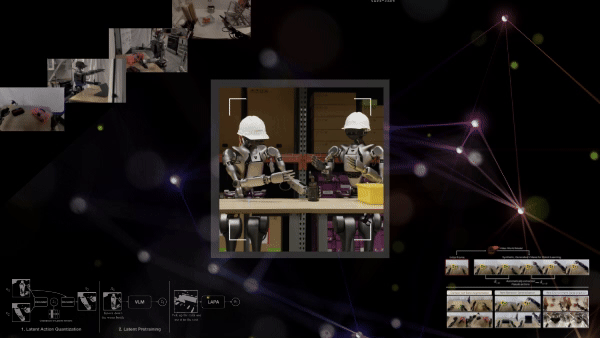Blog
R²D²: Training Generalist Robots with NVIDIA Research Workflows and World Foundation Models

Introduction to R²D²: Revolutionizing Generalist Robots
In the fast-evolving landscape of robotics, the development of generalist robots is crucial for achieving greater autonomy and versatility. The R²D² initiative merges cutting-edge NVIDIA research workflows with advanced world foundation models to train robots that can handle a wide array of tasks. This approach aims to address common challenges in robotics by creating systems that can adapt flexibly to various environments and scenarios.
Understanding R²D² Framework
The R²D² (Robotics Reinforcement Learning Debugging and Development) framework is a sophisticated tool designed to streamline the training and deployment of generalist robots. By integrating powerful workflows with foundation models, R²D² equips robots with the ability to learn from real-world interactions and adapt to new circumstances without needing extensive retraining.
Key Components of R²D²
-
Robust Workflows
At the heart of R²D² lies a collection of advanced workflows that facilitate the efficient development, testing, and deployment of robotic systems. These workflows combine reinforcement learning (RL) techniques with simulations to create a dynamic training environment. - World Foundation Models
These models serve as foundational knowledge bases that allow robots to understand and reason about their surroundings. By leveraging vast amounts of data, including images and sensory input, the foundation models enhance the robots’ decision-making capabilities.
The Benefits of Generalist Robots
Generalist robots stand out due to their ability to perform multiple tasks, making them more adaptable in ever-changing environments. This flexibility is particularly valuable in industries such as healthcare, logistics, and manufacturing.
Versatility in Applications
One of the most significant advantages of generalist robots is their versatile application across various sectors:
- Healthcare: In medical environments, these robots can assist with tasks ranging from patient monitoring to logistical support.
- Logistics: They streamline inventory management, package sorting, and delivery protocols, improving efficiency.
- Manufacturing: In assembly lines, generalist robots can adapt to different product types and manufacturing processes, enhancing production rates and reducing downtime.
Enhanced Learning Capabilities
By utilizing the R²D² framework, generalist robots can learn from a multitude of scenarios, allowing them to make informed decisions based on prior experiences. This continuous learning approach ensures that robots not only perform tasks more effectively but also refine their strategies over time.
Training Techniques in the R²D² Initiative
The R²D² initiative employs several cutting-edge training techniques to foster the development of generalist robots.
Reinforcement Learning
Reinforcement learning plays a vital role in training robots to navigate complex tasks. By receiving feedback from their actions, robots learn to optimize their behavior over time. This method mimics how humans learn from trial and error, enabling machines to become increasingly proficient in their tasks.
Simulated Environments
Simulations are integral to the R²D² framework, allowing robots to practice in a safe, controlled space. These environments mimic real-world scenarios, enabling robots to experiment and learn without the risk of damaging equipment or causing accidents.
Transfer Learning
The concept of transfer learning is also utilized within the R²D² framework. This technique allows robots to apply knowledge learned in one context to different tasks or environments. Consequently, robots can efficiently adapt their skills to meet the demands of new situations without starting from scratch.
Real-World Implementation and Case Studies
The R²D² approach has gained notable traction in multiple industries. Various case studies exemplify the transformative impact of generalist robots powered by NVIDIA’s research workflows.
Case Study: Warehouse Automation
In a large-scale warehouse setting, generalist robots trained using the R²D² framework demonstrated remarkable efficiency in inventory management. These robots utilized reinforcement learning to optimize their routes for picking and sorting goods, thereby reducing the time taken for order fulfillment.
Case Study: Assistive Robotics in Healthcare
Another impressive application is in healthcare, where robots trained through R²D² assist healthcare professionals in patient care and monitoring. These robots adapt to various tasks, including medication delivery and environmental monitoring, thus improving overall patient care while reducing the workload on medical staff.
Future Prospects of R²D² in Robotics
The future appears promising for the R²D² initiative and its implications for generalist robots. As the technology continues to evolve, several key trends are likely to shape the landscape of robotics.
Increased Autonomy
The focus on autonomy will become central to future developments. Generalist robots will be expected to make real-time decisions without human intervention, relying on sophisticated AI algorithms and rich environmental understanding.
Enhanced Collaboration
Collaborative robots, or cobots, will increasingly work alongside humans in various sectors, using insights gained from R²D² training to foster seamless human-robot interaction. This partnership can enhance productivity and worker safety across industries.
Sustainable Robotics
With growing concerns about environmental sustainability, future generalist robots will likely incorporate energy-efficient designs and practices. The R²D² framework can facilitate the development of eco-friendly robotic systems that contribute to greener operations.
Conclusion
R²D² emerges as a pioneering framework in the domain of generalist robotics, integrating NVIDIA’s cutting-edge research workflows with advanced world foundation models. By enabling robots to learn and adapt across diverse tasks and environments, this initiative propels the field of robotics forward. As the technology continues to evolve, the long-term prospects for generalist robots hold the potential for transformative impacts across various industries, promising a future where robots play a central role in our everyday lives.

